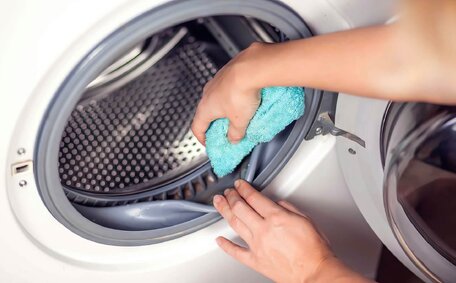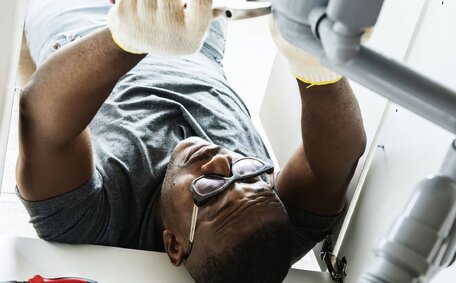What are the health effects of gas leak exposure?
A natural gas leak can pose serious health risks from substances like methane and carbon monoxide. Some key health effects from carbon monoxide (CO) and other gas leak sources include:
- Asphyxiation, due to natural gas displacing oxygen in enclosed spaces, can lead to life-threatening hypoxia.
- Inhaling gases from a leak, such as carbon monoxide, can prevent oxygen from reaching vital organs, possibly causing dizziness, unconsciousness, brain damage, or death.
- Headaches, eye irritation, fatigue, and nausea - caused by exposure to combustion products like nitrogen dioxide and hydrogen sulphide.
Vulnerable individuals are especially at risk, as the signs of a gas leak can significantly impact health. To reduce health risks, it’s crucial to practice natural gas safety by installing CO detectors, maintaining gas appliances, and responding quickly to leak signs.
How to recognize signs of a gas leak
Notice unusual smells
One key indicator of a gas leak is a rotten egg or sulphur-like scent, which is an odorant added by gas companies for safety. Gas companies in your area play a pivotal role as they intentionally add odorants like ethyl mercaptan to help detect gas by scent. A noticeable odour resembling rotten eggs where no scent should be present might indicate a gas leak nearby.
Look and listen for leaks
Signs of water heaters with a gas leak could include bubbling water, dust blowing from a pipe, or dead plants in an otherwise green area, potentially indicating a leak in your home. A hissing sound near appliances or pipelines is another indicator of a potential gas leak.
Check for physical signs
Excess moisture outside your gas heater, smoke exiting pipes, black soot near gas equipment, and a pilot light that goes out unexpectedly can signal potential gas leaks. Frequent pilot light outages or slow ignition of appliances are also indicators of gas leaks in your home.
Be aware of health symptoms
Headaches, dizziness, nausea, and flu-like symptoms often warrant a licensed plumber’s assessment to check for gas leaks. Pets or farm animals showing unusual behaviour can also indicate that there gas leak on your property.
Take action immediately
In the event a small gas leak is discerned in your house, evacuate the area straight away to avoid activities that could ignite it. If you suspect a leak, don’t use phones or flip switches to avoid igniting the gas. Turn off potential ignition sources and from a safe place, call for emergency assistance if you suspect a leak in your home.
Short-term symptoms
Brief exposure to gas heating can immediately affect your health, resulting in symptoms that serve as warning signs. Common short-term symptoms may indicate a gas leak:
- Headaches, dizziness, fatigue, nausea - These are classic signs of carbon monoxide (CO) poisoning exposure, impacting oxygen circulation.
- Eye, nose, throat irritation - Due to contact with sulphur compounds and other gas combustion byproducts.
- Shortness of breath, coughing - Resulting from oxygen deficiency as gas displaces air, leading to a lack oxygen.
- Skin redness or blisters - The result of direct contact with leaking gas under pressure from pipes.
Gas leak health impacts vary, depending on the gas composition, exposure length, and personal health factors. Older adults, pregnant women, children, and those with existing health conditions face greater health risks from gas leaks.
If you experience symptoms indicating a gas leak, especially carbon monoxide exposure, seek fresh air immediately and contact emergency services. Early detection and a swift response to a gas leak your home can mitigate more dangerous long-term health impacts. Installing carbon monoxide detectors is a vital precautionary step.
Long-term health risks
Prolonged or repeated exposure to natural gas leaks poses significant long-term health risks:
- Neurological damage can result from CO poisoning as it impedes blood’s oxygen delivery to the brain, leading to cognitive issues.
- Heart disease - Gas leak toxins strain the cardiovascular system by reducing blood oxygen levels.
- Respiratory illness can arise from permanent lung damage due to recurrent exposure to combustion byproducts.
- Cancer risks are under investigation concerning gas emissions and climate change impacts.
Unborn babies, children, the elderly, those with pre-existing conditions, and workers with frequent exposure are highly susceptible to severe long-term effects. Installing reliable LPG gas detectors, performing annual appliance inspections, and swiftly responding to any leak signs are critical to preventing gas-related incidents.
If prolonged symptoms of CO poisoning persist after gas exposure, seek medical assessment. Be forthcoming with medical professionals about natural gas contact and byproducts, so they’ll know about necessary evaluations to chart the right treatment course.
Vulnerable groups at higher risk
Some groups are at a higher risk from gas leaks, such as:
- Infants and children are more vulnerable to toxins due to their smaller size and developing organs.
- Elderly people - Pre-existing health issues can be aggravated and ability to detect leaks reduced.
- Pregnant women - Gas byproducts can adversely affect your foetal development.
- People with respiratory issues - Pre-existing lung damage means less ability to process toxins.
- Individuals with cardiovascular disease - Already strained systems have less resilience.
These vulnerable groups generally experience more severe leak symptoms when a gas leak can impact their environment. Preventative steps are especially vital, like installing low-level CO detectors in nurseries. Any symptoms from a gas leak exposure warrant immediate medical attention.
What to do if you suspect a gas leak
If you do suspect gas your household is leaking, follow these steps immediately:
- Immediately evacuate and go outside, ensuring everyone else leaves to prevent exposure to a possible gas leak.
- From a safe distance, call 000 or the local fire department and shut off the gas if it’s safe when you suspect a leak.
- Avoid any actions that could ignite gas like turning off electrical devices.
- Do not smoke, use matches, lighters or create any flames.
- Do not use phones or other devices in the affected area.
- Return only after emergency services have declared the area safe.
Checking your gas heaters for leaks should be part of any safety routine when you use gas in your home, workplace or outdoor areas. Stay aware of potential leak sources like gas stoves, heaters, and pipes at home.
Should you detect a signal suggesting a leak, we recommend acting promptly; if you can smell it or hear hissing near gas equipment or notice any physical evidence, err on the side of caution and evacuate immediately.
Preventing and detecting gas leaks
Regular maintenance
Annual servicing of your gas appliances by a licenced professional and having gas lines checked for leaks or damage is crucial for preventive maintenance. Our expert gas fitter can pinpoint faulty gas equipment and minor concerns before they amplify into perilous leaks.
Install detectors
Installing detectors for gas line monitoring and carbon monoxide detectors to warn of dangerous levels is advisable.
Vent properly
Ensure all unflued gas appliances are properly vented to promote safe use natural gas indoors and prevent the buildup of combustion byproducts compromising indoor air quality. Adhere to manufacturer guidelines and understand that when you use natural products like gas, leaks can create hazards especially for gas cooking appliances.
Be alert
Be alert for signs of leaks, such as unusual smells or sounds near gas equipment, and do not ignore symptoms of exposure like dizziness or flu-like signs.
Respond immediately
If you suspect a gas leak, immediately evacuate the property, contact emergency services from outside, and do not re-enter until it’s declared safe. Trying to locate or stop a gas leak yourself could create ignition hazards.
Proactively follow gas safety tips and maintain safe practices to protect your family’s well-being and prevent health issues. Make leak prevention part of regular procedures in your house and respond urgently where threats exist.





